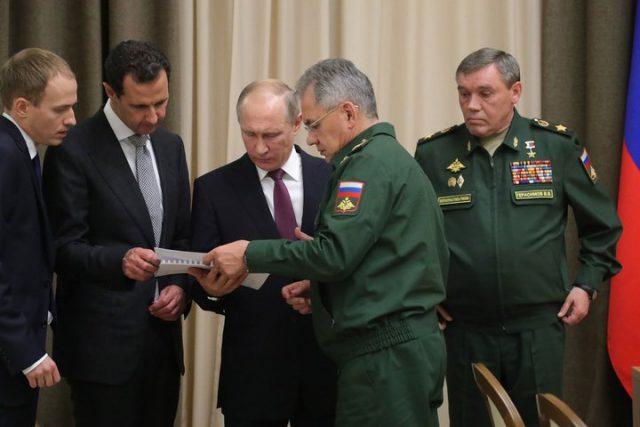The US needs a Syria strategy
Posted By Shlomo Ben-Ami on April 28, 2018 @ 09:00

US President Donald Trump lauded the missile strikes by the United States, France and the United Kingdom on Syrian military installations—carried out in retaliation for a chemical-weapon attack allegedly perpetrated by Bashar al-Assad’s regime—as a great success. But no amount of triumphant rhetoric can obscure the West’s betrayal of the Syrian people, nor disguise its lack of any actual strategy for resolving the Syria conflict.
In the last seven years, nearly a half-million Syrian citizens have been killed and seven million have been made refugees. Meanwhile, an unholy alliance has formed among Shia zealots, represented by Iran and Hezbollah, and a Russian government committed to unravelling the post-Cold War order and radically changing the strategic game in the Middle East.
The West has utterly failed to rise to this challenge. On the contrary, Trump is about to withdraw the remaining US troops from Syria, arguing that their main objective—defeating the Islamic State (ISIS)—has been achieved. Yet, while ISIS had to be stopped, it was never the West’s most formidable enemy in Syria; that title goes to the axis of Russia, Iran, Hezbollah and the Assad regime—an axis against which ISIS was actually a counterbalancing force.
Now, all the West has to offer is what Secretary of Defense Jim Mattis called ‘a one-time shot’ of overly cautious strikes that targeted none of the conventional capabilities of Assad’s regime and its allies. Like the limited US missile strikes last year, the recent attack will not deter the future use of chemical weapons, much less threaten the survival of Assad’s regime.
Even if the strikes did send the message that chemical weapons would not be tolerated—an ostensibly reasonable red line, given the experience with chemical weapons in the twentieth century’s two world wars—they could also be interpreted as a signal that other means of slaughter are fair game. And chemical weapons have been responsible for less than 1% of the deaths in the Syrian war so far; the vast majority having been caused by conventional weapons.
In fact, the focus on chemical weapons could end up helping to increase the body count. According to Russian Foreign Minister Sergey Lavrov, the recent US-led strike could serve as a pretext [1] for further strengthening the Assad regime’s conventional capabilities by supplying it with Russia’s advanced S-300 air-defence system.
The strikes are already having another unintended effect: boosting Assad’s popularity. He can now be portrayed as the victim of the same colonial powers that collude with Saudi Arabia as it massacres Yemenis, and with Israel as it oppresses Palestinians.
America’s withdrawal from the strategic equation in Syria may even hurt its own allies. In particular, it leaves Israel alone to confront the threat posed by Iran, Hezbollah, Hamas and Russia.
Instead of pushing Trump to withdraw from the 2015 Iran nuclear agreement, Israeli Prime Minister Binyamin Netanyahu should have been securing a US presence on the Syria–Lebanon front, which Iran and its proxy, Hezbollah, seem determined to turn into a hot one. The attack on Israel by an armed Iranian drone a few weeks ago, and Israel’s strikes against Iranian military installations in Syria in response, are unprecedented, with a high potential for escalation. Without a strong US presence in the region, not even the unlikely scenario of a confrontation between Israel and Russia can be fully discounted.
So what should a US strategy look like? For starters, an American force should help to stabilise those parts of the country that ISIS has vacated, but Assad does not control. Moreover, the US should use its clout with Turkey and the Syrian Kurds to broker an agreement that enables the creation of an autonomous Kurdish region in northern Syria. A permanent Turkish-controlled buffer zone could mitigate that country’s fears that fighters and weapons would flow to Kurds inside Turkey.
An American initiative to bring peace to Syria might even be a blessing in disguise for Russian President Vladimir Putin, as it would enable him to escape a trap of his own making. Despite having declared ‘mission accomplished’ on at least three occasions, Putin is incapable of reaching a political settlement among the many stakeholders in Syria.
Putin’s dilemma is that he is both unwilling to sustain the conflict until Assad controls the entire country (the only version of ‘peace’ that Assad is prepared to accept) and unwilling to risk the regime’s collapse by pulling out altogether. In this sense, Russia is both a master of Syria (along with Iran) and a hostage of the Assad regime—one who can be freed only by the US.
Complicating matters further for Russia, as well as for Iran, is that any economic returns Syria yields—through contracts for oil, military supplies, and telecoms, and control of phosphate mines—cannot cover the costs of reconstructing the Syrian state and repatriating millions of refugees. Only the US and the Gulf states (all sworn enemies of Assad) could do that. But there is no way they will foot the estimated $100–300 billion bill [2] without having a say in the political outcome.
The last time a US president boastfully proclaimed ‘mission accomplished’ was in 2003, when George W. Bush, just six weeks after invading Iraq, declared that major combat operations there had ended. Instead, those operations lasted eight more years, and US troops remain in Iraq to this day. Trump failed to heed that historical lesson, which suggests that, like Bush, he doesn’t know what the mission is.
Article printed from The Strategist: https://aspistrategist.ru
URL to article: /us-needs-syria-strategy/
URLs in this post:
[1] could serve as a pretext: https://sputniknews.com/middleeast/201804171063634749-lavrov-s300-missile-attack-syria/
[2] estimated $100–300 billion bill: https://syria.liveuamap.com/en/2017/27-november-de-mistura-the-cost-of-reconstruction-of-syria
Click here to print.